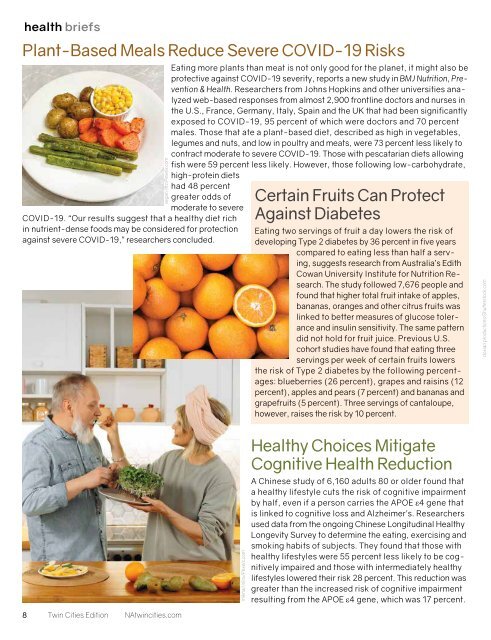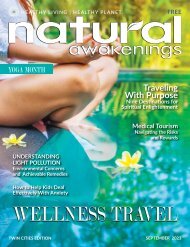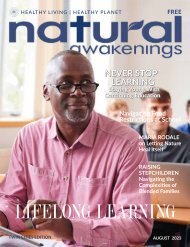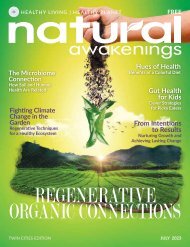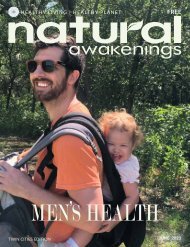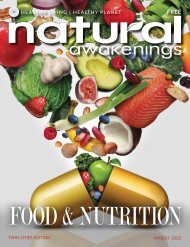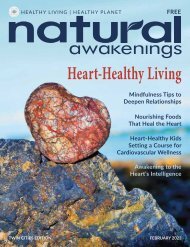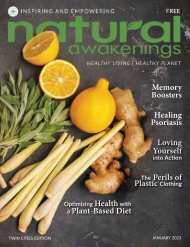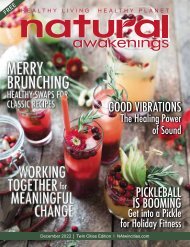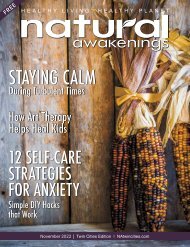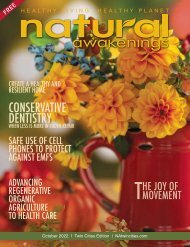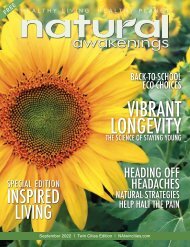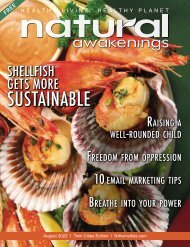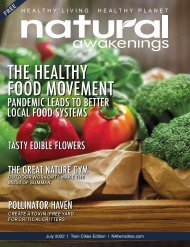Natural Awakenings Twin Cities September 2021
Read the September 2021 edition of Natural Awakenings Twin Cities magazine. This is our annual Inspired Living Issue which is focused on Creativity in Health and Healing and Integrative Pain Management. Topics also include the power of the written word, finding pain relief in essential oils, natural approaches to combating opioid abuse, creative kids, and so much more! Be sure to check out our local content including News Briefs announcements, Community Resource Guide with providers throughout the metro who can meet your individual wellness needs, and all the happenings in the Calendar of Events. There is additional online-only content that can be found at NATwinCities.com. While you are there, be sure to sign up for our Newsletter and Digital Magazine and continue your reading with our archived articles from local experts.
Read the September 2021 edition of Natural Awakenings Twin Cities magazine. This is our annual Inspired Living Issue which is focused on Creativity in Health and Healing and Integrative Pain Management. Topics also include the power of the written word, finding pain relief in essential oils, natural approaches to combating opioid abuse, creative kids, and so much more!
Be sure to check out our local content including News Briefs announcements, Community Resource Guide with providers throughout the metro who can meet your individual wellness needs, and all the happenings in the Calendar of Events. There is additional online-only content that can be found at NATwinCities.com.
While you are there, be sure to sign up for our Newsletter and Digital Magazine and continue your reading with our archived articles from local experts.
Create successful ePaper yourself
Turn your PDF publications into a flip-book with our unique Google optimized e-Paper software.
health briefs<br />
Plant-Based Meals Reduce Severe COVID-19 Risks<br />
greater odds of<br />
moderate to severe<br />
COVID-19. “Our results suggest that a healthy diet rich<br />
in nutrient-dense foods may be considered for protection<br />
against severe COVID-19,” researchers concluded.<br />
vegan liftz/Pexels.com<br />
Eating more plants than meat is not only good for the planet, it might also be<br />
protective against COVID-19 severity, reports a new study in BMJ Nutrition, Prevention<br />
& Health. Researchers from Johns Hopkins and other universities analyzed<br />
web-based responses from almost 2,900 frontline doctors and nurses in<br />
the U.S., France, Germany, Italy, Spain and the UK that had been significantly<br />
exposed to COVID-19, 95 percent of which were doctors and 70 percent<br />
males. Those that ate a plant-based diet, described as high in vegetables,<br />
legumes and nuts, and low in poultry and meats, were 73 percent less likely to<br />
contract moderate to severe COVID-19. Those with pescatarian diets allowing<br />
fish were 59 percent less likely. However, those following low-carbohydrate,<br />
high-protein diets<br />
had 48 percent<br />
Certain Fruits Can Protect<br />
Against Diabetes<br />
Eating two servings of fruit a day lowers the risk of<br />
developing Type 2 diabetes by 36 percent in five years<br />
compared to eating less than half a serving,<br />
suggests research from Australia’s Edith<br />
Cowan University Institute for Nutrition Research.<br />
The study followed 7,676 people and<br />
found that higher total fruit intake of apples,<br />
bananas, oranges and other citrus fruits was<br />
linked to better measures of glucose tolerance<br />
and insulin sensitivity. The same pattern<br />
did not hold for fruit juice. Previous U.S.<br />
cohort studies have found that eating three<br />
servings per week of certain fruits lowers<br />
the risk of Type 2 diabetes by the following percentages:<br />
blueberries (26 percent), grapes and raisins (12<br />
percent), apples and pears (7 percent) and bananas and<br />
grapefruits (5 percent). Three servings of cantaloupe,<br />
however, raises the risk by 10 percent.<br />
doxiao productions/Shutterstock.com<br />
mikhail nilov/Pexels.com<br />
Healthy Choices Mitigate<br />
Cognitive Health Reduction<br />
A Chinese study of 6,160 adults 80 or older found that<br />
a healthy lifestyle cuts the risk of cognitive impairment<br />
by half, even if a person carries the APOE ε4 gene that<br />
is linked to cognitive loss and Alzheimer’s. Researchers<br />
used data from the ongoing Chinese Longitudinal Healthy<br />
Longevity Survey to determine the eating, exercising and<br />
smoking habits of subjects. They found that those with<br />
healthy lifestyles were 55 percent less likely to be cognitively<br />
impaired and those with intermediately healthy<br />
lifestyles lowered their risk 28 percent. This reduction was<br />
greater than the increased risk of cognitive impairment<br />
resulting from the APOE ε4 gene, which was 17 percent.<br />
8 <strong>Twin</strong> <strong>Cities</strong> Edition NAtwincities.com


